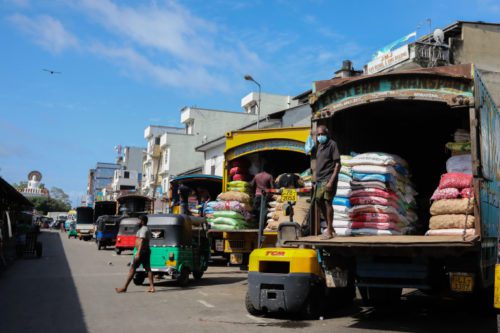Sri Lanka declares food emergency as forex crisis worsens
Sri Lanka has declared a state of emergency over food shortages as private banks run out of foreign exchange to finance imports.
With the country suffering a hard-hitting economic crisis, President Gotabaya Rajapaksa on Tuesday said he has ordered emergency regulations to counter the hoarding of sugar, rice and other essential foods.
The regulations give wide powers to officials to seize food stocks held by traders, arrest people who hoard essential food and for the government to fix controlled prices.
Rajapaksa has named a top army officer as Commissioner General of Essential Services to coordinate the supply of paddy, rice, sugar and other consumer goods.

The move followed sharp price rises for sugar, rice, onions and potatoes, while long queues have formed outside stores because of shortages of milk powder, kerosene oil and cooking gas despite the country being under a 16-day curfew until next Monday due to the increase in COVID-19 cases.
Trade Minister Bandula Gunawardena said some traders were hoarding stocks, resulting in shortages of food items and causing inconvenience to the public.
The government has increased penalties for food hoarding but the shortages come as the country of 21 million battles a fierce coronavirus wave that is claiming more than 200 lives a day.
The economy shrank by a record 3.6 percent in 2020 because of the pandemic and in March last year, the government banned imports of vehicles and other items, including edible oils and turmeric, an essential spice in local cooking, in a bid to save foreign exchange.
Importers still say they have been unable to source dollars to pay for the food and medicines they are allowed to buy.
Two weeks ago, the Central Bank of Sri Lanka increased interest rates in a bid to shore up the local currency.
Sri Lanka’s foreign reserves fell to $2.8bn at the end of July, from $7.5bn in November 2019 when the government took office and the rupee has lost more than 20 percent of its value against the US dollar in that time, according to bank data.
Energy minister Udaya Gammanpila has appealed to motorists to use fuel sparingly so that the country can use its foreign exchange to buy essential medicines and vaccines.
A presidential aide has warned that fuel rationing may be introduced by the end of the year unless consumption was reduced.
Meanwhile, there has been a rapid increase in COVID-19 deaths in Sri Lanka in the past few weeks, with more than 200 deaths a day and more than 4,500 daily cases reported for the past 10 days.
Sri Lanka has recorded 8,991 COVID-related deaths since the start of the pandemic, according to official figures.

